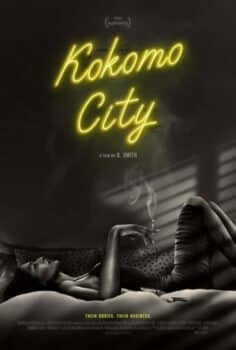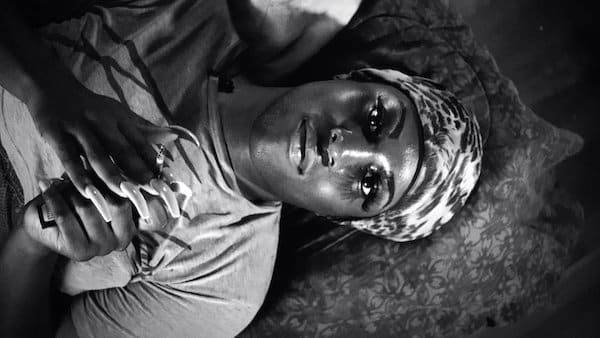The new documentary Kokomo City is a raw and unfiltered look into the lives of Black trans women sex workers. In a time when legislative persecution of those belonging to the LGBTQ community is running rampant in a number of states, the film arrives unapologetically, daring viewers to hear the truths of its subjects. Kokomo City is bursting with energy that makes it engrossing even when the narrative feels a bit scattered at times. It doesn’t attempt to tie the topic into a neat bow at the end, which will leave the audience with a lot to digest once the credits roll.
Directed by debut filmmaker D. Smith, the documentary offers an edgy but rare look into the lives of Black transgender women. Taking center stage, the women share their different life experiences as we get a glimpse into the world they live in. Smith takes away the distraction of vibrant colors and flashy scenery by filming Kokomo City in black and white. The ladies are interviewed in their homes and the various parts of the city they live in. This allows the audience to focus more on the words spoken and the wide array of themes explored. With a running time of just 74 minutes, the film manages to touch on a good amount of topics in an intimate way. It’s essentially a slice of life documentary on human beings that don’t normally get this kind of focus.
That’s because far too often when reporting is done on Black transgender women it is not in relation to how they lived but rather how they died. Over the course of four years—2017 to 2021—the number of transgender killings increased by 93 percent, according to a study on Everytown.org. Of those deaths, and in the years following, Black trans women were killed at a particularly disproportionate rate. This can be attributed partly to the intersecting issues of poverty, racism, and anti-LGBTQ sentiments that find many Black transgender women having no choice but to end up in professions that are associated with violence, danger, and criminalization.

Kokomo City movie poster
This is one of the themes at the heart of Smith’s documentary. The film doesn’t shy away from the fact that many of the women in the movie ended up in sex work because they were not often allowed to have other kinds of careers due to discrimination or extreme poverty. This puts many of the women in dangerous predicaments where they could end up murdered or brutally beaten by some of their clients or others around them.
This sentiment strikes a chilling nerve when finding out that months after the documentary was completed one of the film’s stars—Koko Da Doll—was found shot to death near an Atlanta, Georgia shopping plaza on April 18. Her testimony in the doc takes on a haunting weight as she describes the real dangers and her desire to build something new and different through her music.
The topics explored are profoundly unfiltered—in a good way. Smith doesn’t care to play into respectability politics when allowing her stars to give their thoughts. This makes for some interesting takes on sex, relationships, and power. And that’s not to say that viewers will whole-heartedly agree with everything being said by the participants. That actually might be quite the opposite on a number of subjects.
Things get a bit touchy when the conversation veers into the dynamics between Black cisgender women, Black transgender women, and the overall Black community. Some “messy” things are said by some that might not sit right with others. Yet, moments like these throughout the documentary give credence to the fact that topics like this are complex and nuanced. No community is a monolith, and by acknowledging this perhaps real conversations can be had.
And while the women of this documentary belong to a marginalized community, in order to have real progress, their voices—and others like them—can not remain on the sidelines. When it comes to the idea of LGBTQ liberation it cannot be forgotten that Black transgender women were and continue to be on the frontlines.

Koko Da Doll in Kokomo City, a Magnolia Pictures release. (Photo: Magnolia Pictures)
Marsha “Pay It No Mind” Johnson was a Black trans woman who was a leader of the LGBTQ+ movement in New York City for over twenty years. As a sex worker and drag performer she was one of the key leaders of the historic Stonewall Riots. Johnson also co-founded the activist organization Street Transvestite Action Revolutionaries (STAR) with Sylvia Rivera—another trans woman of color. STAR was a collective that aimed to offer resources such as housing for LGBTQ youth and sex workers.
People like Johnson, Rivera, and others like them are not who we normally get taught about in the mainstream or regular education system. Yet, without their stories told, the big picture of liberation for all will remain incomplete.
Kokomo City could have perhaps benefited from someone giving an overall analysis throughout in order to connect all the various themes. Then again, one could argue that we as viewers are so used to overly polished documentaries that we find it to be a negative when an “expert” isn’t present in order to lay it all out for us. Participants Daniella Carter, Dominique Silver, Koko Da Doll, and Liyah Mitchell are the experts of their own lived experiences. Their testimonies are more than enough in creating an impactful slice of life film that is sure to spark conversation.
Kokomo City is now playing in select theaters.
Chauncey K. Robinson is an award winning journalist and film critic. Born and raised in Newark, New Jersey, she has a strong love for storytelling and history. She believes narrative greatly influences the way we see the world, which is why she’s all about dissecting and analyzing stories and culture to help inform and empower the people.

